仁爱版七年级英语下册知识点总结(全册)
(完整版)仁爱版英语七年级下全部知识点总结.doc

七年级下英语知识点总结Unit 5 Topic1㈠短语总结1.在学校大门口 at the school gate2.来学校come to school3. 去学校go to school4. 上课have class / have classes5. 步行on foot6.骑自行车ride a bike/ ride bikes/ by bike / on a bike7.坐公交by bus / take a bus8.坐地铁by subway / take the subway / on the subway9.坐飞机by plane/ take the plane / on the plane10.坐小汽车by car / in a car/ take a car/ drive a car11. 坐轮船by ship12. 坐小船by boat13. 坐火车by train / on the train14. 在我们组in our group15.一群学生a group of students16.我们中的三个人 three of us17.在平日 on weekdays18.在周末 on the weekends / at weekends19.起床 get up20.睡觉 go to bed21.早起 get up early22.回家 go home23.到家 get home24.去动物园 go to the zoo25.去公园 go to the park26.看电影 see a movie / film27.看电视 watch TV28.在晚上 in the evening / at night29.帮助父母 help parents30.做某人的家庭作业 do one’s ( my/ her/ his/ your/ their)homework31.在学校 at school32.知道 ,了解 know about / learn about33.校园生活 school life34.一个美国学生 an American student35.在美国 in America / in the U.S.A.36.许多学生 many students/ a lot of students/ lots of students37.很少 very few38.吃午饭 have lunch39.出去吃饭 eat out40.在校期 on school days41.休息一会 have a short rest/ break42.午后 after lunch43.在某人的余 in one’s ( my/ his/ her/ their⋯)free/ spare time44.打球 play basketball45.踢足球 play soccer / football46.琴 play the piano47.吉他 play the guitar48.拉二胡 play erhu49.去游泳 go swimming / go for a swim50.去划船 go boating51.球 a ball game / ball games52.一年四次 four times a year53.听音 listen to music54.read books55.看 read newspapers56.看医生 see a doctor57.去 go to the library58.一周两次 twice a week59.朋友 meet friends60.每天 every day61.在七点半 at half past seven62.一小会 for a little while / for a short time63.晚后 after supper64.吃 have dinner65.吃早 have breakfast㈡重要句型1.I usually come to school by subway.同句 : I usually take the subway to school.划部分提 : How do you usually come to school?似的有:go to school by bike=go to schoolon a bike= ride a bike to school=ride to schoolgo home by bus=go home on a bus=take a bus home2.How do you usually/ often⋯?你通常 /常怎⋯?3.It ’stime for class.=It’s time to have class. =It’s time for having class.4.What about you? =How about you?5.How often ⋯? 率,回答可以用率副: always, usually, often,sometimes, seldom, never, every day ,every +其他名或表示率的短回答表示率的短:次数 +位e.g. : once a day / twice a week / three times a month6.The early bird catches the work. ( ) 笨先7.Work / Study must come first. 工作 / 学必放在第一位!8. Classes begin at eight. =Class begins at eight.提问:What time does the class begin? / What time do the classes begin?㈢重要单词的用法1.look (感官动词 ) 看起来,后面加形容词His mother looks very young.They look very cute.Her dress looks very nice.You look very cool in this coat.2. by 介词by 后面直接加表示交通工具的名词,中间不用任何词修饰,如: by bike by +动词 ing 形式,表示通过某种方式People show love to their mothers by giving cards.You can be a good student by working hard.3.over (形容词 ) School/ Class is over.4.begin现在分词 : beginning 过去式 : beganbegin to do sth , begin doing sthHe begins to write a letter. =He begins writing a letter.如果 begin 本身为分词,只能用begin to do sthHe is beginning to run.5.listen to 听(动作), hear 听见 (结果 )6.always 反义词 never7.本话题涉及的时态为一般现在时,句中常有频率副词或表示频率的短语,如果主语为三单,动词一定要用三单!(四)易错题1.You new watch ______ (look) very nice!2.Here ______(be) some news.3.Oh, come on! It’s time_____ going to school.4.They usually go to school on ________(feet).5.In my class, forty of _______(we) go to school by bike.6.The early bird ______ (catch) the worm.7.Kangkang often _____ (ride) a bike to the park.8.What time _____ (be)school over?9.Work must come ______(once).10.It ’stime ____you to get up.11.We often _____ books in the morning.12.Jill ’s friend like ______(study) in our school.13.Mr. Wang teaches ______(we) English. _____ of us like him.14.How about ______(go) out with me?15.Most students go to school _____ the school bus.16._______ do you go shopping with your mother?A. How soonB. How farC. How oftenD. How much17. What time do you usually get up _____ weekdays?18. He ______ busy, so he has no time to play with us.A. is alwaysB. seldom isC. always isD. often is19.The last class______(finish) at twelve o’clock.20.Let’s go______(boat).21.It’stime to have breakfast. 同(义句 )______________________________________________________.22.Michael often rides a bike to school. 同(义句 )______________________________________________________.23.I always go to work on foot. (对划线部分提问 )______________________________________________________.24.My mother goes shopping twice a week. 对(划线部分提问 )______________________________________________________.25.Mary always reads books in the library. 反(义句 )______________________________________________________.26.He usually does his homework at school.否(定句 )______________________________________________________.27.They often go to school by bus in the morning. 对(划线部分提问 ) ______________________________________________________.28.Jane seldom watches TV on weekdays改.(为一般疑问句 )______________________________________________________.29.He usually has lunch at home. 对(划线部分提问 )______________________________________________________.30.Li Ping often goes to work on foot. (同义句 )______________________________________________________.31.几乎没有学生乘地铁去学校。
七年级英语仁爱版下册知识点总结topic1.
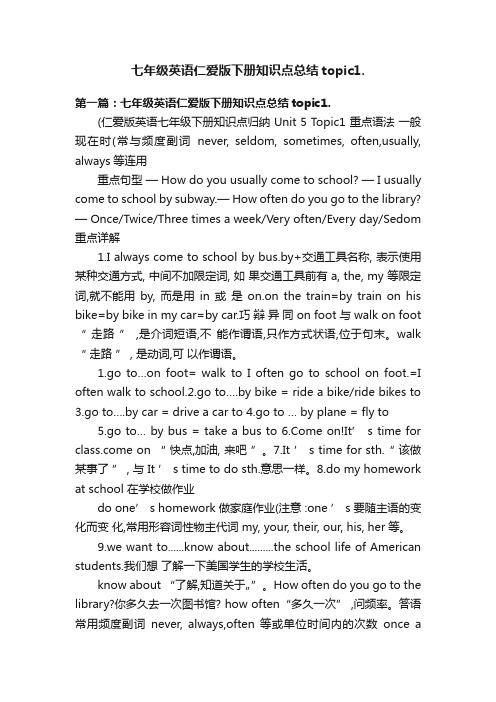
七年级英语仁爱版下册知识点总结topic1.第一篇:七年级英语仁爱版下册知识点总结topic1.(仁爱版英语七年级下册知识点归纳 Unit 5 Topic1 重点语法一般现在时(常与频度副词never, seldom, sometimes, often,usually, always等连用重点句型— How do you usually come to school? — I usually come to school by subway.— How often do you go to the library? — Once/Twice/Three times a week/Very often/Every day/Sedom 重点详解1.I always come to school by bus.by+交通工具名称, 表示使用某种交通方式, 中间不加限定词, 如果交通工具前有 a, the, my 等限定词,就不能用by, 而是用in 或是on.on the train=by train on his bike=by bike in my car=by car.巧辩异同 on foot 与 walk on foot “ 走路” ,是介词短语,不能作谓语,只作方式状语,位于句末。
walk “ 走路” , 是动词,可以作谓语。
1.go to…on foot= walk to I often go to school on foot.=I often walk to s chool.2.go to….by bike = ride a bike/ride bikes to3.go to….by car = drive a car to4.go to … by plane = fly to5.go to… by bus = take a bus toe on!It’ s time for e on “ 快点,加油, 来吧”。
(完整版)仁爱版七年级英语下册知识点总结
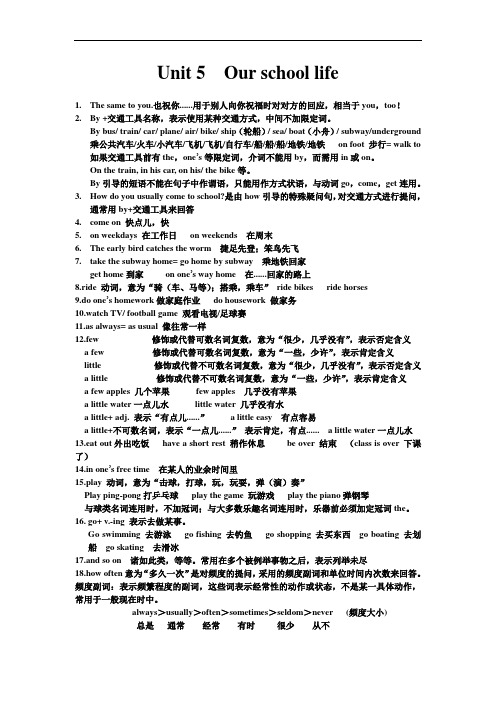
Unit 5 Our school life1.The same to you.也祝你......用于别人向你祝福时对对方的回应,相当于you,too!2.By +交通工具名称,表示使用某种交通方式,中间不加限定词。
By bus/ train/ car/ plane/ air/ bike/ ship(轮船)/ sea/ boat(小舟)/ subway/underground 乘公共汽车/火车/小汽车/飞机/飞机/自行车/船/船/船/地铁/地铁on foot 步行= walk to 如果交通工具前有the,one’s等限定词,介词不能用by,而需用in或on。
On the train, in his car, on his/ the bike等。
By引导的短语不能在句子中作谓语,只能用作方式状语,与动词go,come,get连用。
3.How do you usually come to school?是由how引导的特殊疑问句,对交通方式进行提问,通常用by+交通工具来回答e on 快点儿,快5.on weekdays 在工作日on weekends 在周末6.The early bird catches the worm 捷足先登;笨鸟先飞7.take the subway home= go home by subway 乘地铁回家get home到家on one’s way home 在......回家的路上8.ride 动词,意为“骑(车、马等);搭乘,乘车”ride bikes ride horses9.do one’s homework做家庭作业do housework 做家务10.watch TV/ football game 观看电视/足球赛11.as always= as usual 像往常一样12.few 修饰或代替可数名词复数,意为“很少,几乎没有”,表示否定含义a few 修饰或代替可数名词复数,意为“一些,少许”,表示肯定含义little 修饰或代替不可数名词复数,意为“很少,几乎没有”,表示否定含义a little 修饰或代替不可数名词复数,意为“一些,少许”,表示肯定含义a few apples 几个苹果few apples 几乎没有苹果a little water一点儿水little water 几乎没有水a little+ adj. 表示“有点儿......” a little easy 有点容易a little+不可数名词,表示“一点儿......”表示肯定,有点...... a little water一点儿水13.eat out外出吃饭have a short rest 稍作休息be over 结束(class is over 下课了)14.in one’s free time 在某人的业余时间里15.play 动词,意为“击球,打球,玩,玩耍,弹(演)奏”Play ping-pong打乒乓球play the game 玩游戏play the piano弹钢琴与球类名词连用时,不加冠词;与大多数乐趣名词连用时,乐器前必须加定冠词the。
七年级下册英语仁爱版知识点总结
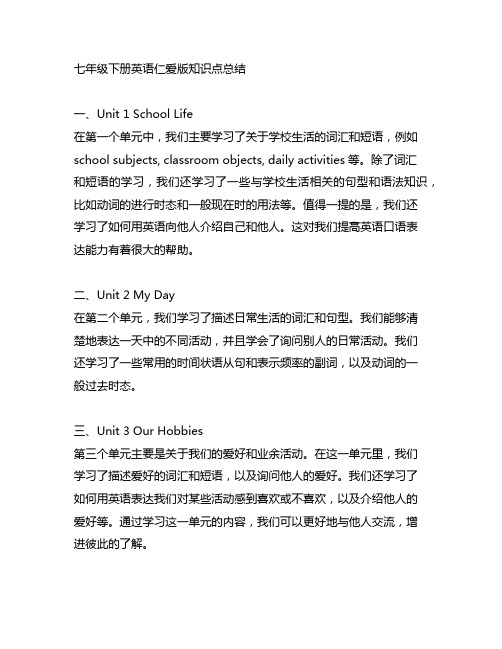
七年级下册英语仁爱版知识点总结一、Unit 1 School Life在第一个单元中,我们主要学习了关于学校生活的词汇和短语,例如school subjects, classroom objects, daily activities等。
除了词汇和短语的学习,我们还学习了一些与学校生活相关的句型和语法知识,比如动词的进行时态和一般现在时的用法等。
值得一提的是,我们还学习了如何用英语向他人介绍自己和他人。
这对我们提高英语口语表达能力有着很大的帮助。
二、Unit 2 My Day在第二个单元,我们学习了描述日常生活的词汇和句型。
我们能够清楚地表达一天中的不同活动,并且学会了询问别人的日常活动。
我们还学习了一些常用的时间状语从句和表示频率的副词,以及动词的一般过去时态。
三、Unit 3 Our Hobbies第三个单元主要是关于我们的爱好和业余活动。
在这一单元里,我们学习了描述爱好的词汇和短语,以及询问他人的爱好。
我们还学习了如何用英语表达我们对某些活动感到喜欢或不喜欢,以及介绍他人的爱好等。
通过学习这一单元的内容,我们可以更好地与他人交流,增进彼此的了解。
四、Unit 4 Celebrations第四个单元主要是关于庆祝活动。
我们学习了描述不同庆祝活动的词汇和短语,以及询问别人关于庆祝活动的相关问题。
我们还学习了一些关于时间的表达方式,比如日期、星期、月份等。
我们还学习了一些关于情感的形容词,以及表示祝福的句型和短语。
五、Unit 5 The World Around Us在第五个单元中,我们学习了描述环境和自然现象的词汇和短语,以及相关的句型和语法知识。
我们可以用英语描述不同的自然现象,比如天气、季节等,也能够表达对自然环境的关心和热爱。
除了这些,我们还学习了一些关于地点和方位的词汇,以及表示允许和禁止的句型和短语。
六、Unit 6 Amazing Stories在第六个单元中,我们学习了一些关于神话故事和传奇人物的词汇和短语。
(完整版)仁爱英语七年级下册重要知识点和语法点归纳,推荐文档

Unit 5 Our School Lifetopic1How do you go to school?一、重点词语:1. wake up醒来,唤醒get up起床2. go to school去上学go home 回家3. go dancing / shopping / skating / swimming去跳舞;购物、滑冰;游泳go doing something可用于表达去进行某种娱乐休闲活动。
4.表示交通方式:on foot步行by boat坐船by ship坐船by air乘飞机by plane乘飞机by train坐火车by subway搭乘地铁by car坐小汽车by bus坐公共汽车by bike骑自行车5. take the subway / bus / car搭乘地铁;公共汽车;小汽车6. drive a car to work = go to work by car驾车去上班take a bus to work = go to work by bus乘公共汽车去上班go to school on foot = walk to school步行去上学7. ride a bike / horse骑自行车;骑马8. after school / class放学以后;下课以后9. play the piano / guitar / violin弹钢琴;吉他;小提琴play basketball / soccer / football打篮球;踢足球;打橄榄球play computer games玩电脑游戏play with a computer玩电脑play sports做运动10. next to紧挨着,在⋯旁边11. a plan of my school一幅我们学校的平面图12. on weekdays在工作日at weekends在周末13. have breakfast / lunch / supper / dinner / meals吃早餐;中餐;晚餐;正餐;一日三餐have classes / lessons / a meeting上课;上课;开会14. watch TV / movies / games / the animals看电视;电影;比赛;动物read novels / newspapers / books看小说;报纸;书15. wash one ’s face / clothes洗脸;衣服16. 反义词: up – down, early– late近义词:quickly– fastget up early早起be late for迟到17. the first / second / third / fourth day第一;二;三;四天18. clean the house打扫房子19.表示建筑物(尤其学校建筑物):on the playground在操场at school / home / table在学校;家里;桌旁in a computer room / teachers’ office / classroom building / gym / library / lab / canteen在电脑室;教师办公室;教学楼;体操馆;图书馆;实验室;食堂20. around six o’clock = at about six o’clock大约在六点21. 频率副词: never, seldom, sometimes, often, usually, always二、重点句型:1.It’s time to get up.该起床的时候了。
仁爱版英语七年级下最全全部全部知识点总结
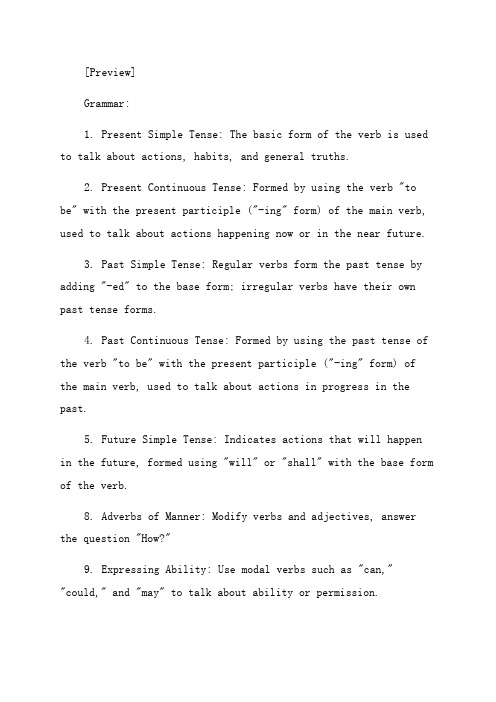
[Preview]Grammar:1. Present Simple Tense: The basic form of the verb is used to talk about actions, habits, and general truths.2. Present Continuous Tense: Formed by using the verb "to be" with the present participle ("-ing" form) of the main verb, used to talk about actions happening now or in the near future.3. Past Simple Tense: Regular verbs form the past tense by adding "-ed" to the base form; irregular verbs have their own past tense forms.4. Past Continuous Tense: Formed by using the past tense of the verb "to be" with the present participle ("-ing" form) of the main verb, used to talk about actions in progress in the past.5. Future Simple Tense: Indicates actions that will happen in the future, formed using "will" or "shall" with the base form of the verb.8. Adverbs of Manner: Modify verbs and adjectives, answer the question "How?"9. Expressing Ability: Use modal verbs such as "can," "could," and "may" to talk about ability or permission.10. Articles: "A," "an," and "the" are used to indicate whether a noun is specific or nonspecific.11. Prepositions: Words that show the relationship between a noun/pronoun and other words in a sentence.Vocabulary:2. Verbs and Adjectives: Actions, feelings, descriptions, etc.4. Hobbies and Sports: Vocabulary related to leisure activities and sports.5. Jobs and Professions: Vocabulary related to different occupations.6. Places: Vocabulary related to different locations and buildings.8. Environment: Vocabulary related to nature, pollution, and conservation.Reading:2. Skimming and Scanning: Techniques for quickly locating information in a text.3. Inferred Meaning: Inferring information from context clues.4. Making Inferences: Drawing conclusions based on information provided.5. Critical Thinking: Analyzing and evaluating text to form opinions and make judgments.Listening:2. Listening for Specific Information: Identifying key details or specific information in spoken English.3. Understanding Dialogue: Listening to conversations and understanding the roles and intentions of the speakers.4. Listening for Inferred Meaning: Inferring informationthat is not explicitly stated from the context.Speaking:1. Dialogue Practice: Engaging in conversations with classmates or teachers to practice spoken English.3. Pronunciation: Practicing correct pronunciation of words and sounds.4. Fluency: Developing the ability to speak English smoothly and confidently.Writing:1. Sentence Structure: Writing sentences with proper grammar and word order.2. Paragraph Writing: Organizing ideas and writing coherent paragraphs.3. Descriptive Writing: Using adjectives and sensorylanguage to describe people, places, and things.4. Narrative Writing: Writing stories with a clear beginning, middle, and end.5. Letter Writing: Understanding the format and structure of formal and informal letters.7. Editing and Proofreading: Correcting errors in spelling, grammar, punctuation, and sentence structure.。
仁爱版英语七年级下全部知识点总结
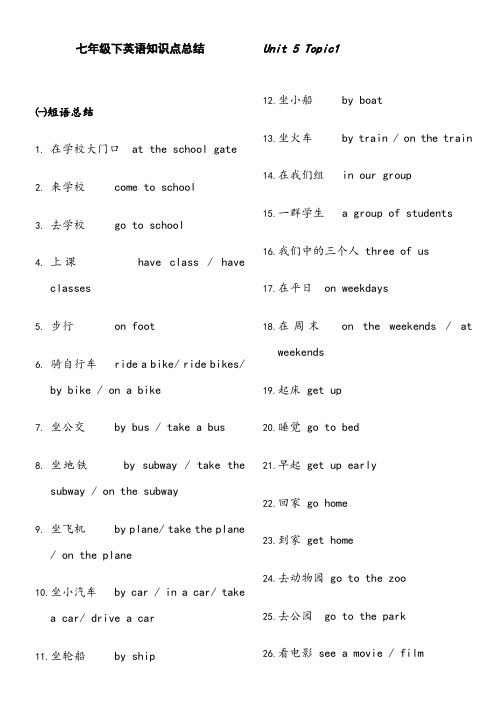
七年级下英语知识点总结Unit 5 Topic1㈠短语总结1.在学校大门口 at the school gate2.来学校 come to school3.去学校 go to school4.上课have class / haveclasses5.步行 on foot6.骑自行车 ride a bike/ ride bikes/by bike / on a bike7.坐公交 by bus / take a bus8.坐地铁 by subway / take thesubway / on the subway9.坐飞机 by plane/ take the plane/ on the plane10.坐小汽车 by car / in a car/ takea car/ drive a car11.坐轮船 by ship 12.坐小船 by boat13.坐火车 by train / on the train14.在我们组 in our group15.一群学生 a group of students16.我们中的三个人 three of us17.在平日 on weekdays18.在周末on the weekends / atweekends19.起床 get up20.睡觉 go to bed21.早起 get up early22.回家 go home23.到家 get home24.去动物园 go to the zoo25.去公园 go to the park26.看电影 see a movie / film27.看电视 watch TV28.在晚上 in the evening / at night29.帮助父母 help parents30.做某人的家庭作业 do one’s ( my/her/ his/ your/ their)homework31.在学校 at school32.知道,了解 know about / learn about33.校园生活 school life34.一个美国学生 an American student35.在美国 in America / in the 许多学生many students/ a lot of students/ lots of students36.很少 very few37.吃午饭 have lunch38.出去吃饭 eat out39.在校期间 on school days40.休息一会 have a short rest/ break41.午饭后 after lunch 42.在某人的业余时间in one’s ( my/his/ her/ their…)free/ spare time43.打篮球 play basketball44.踢足球play soccer / football45.弹钢琴 play the piano46.弹吉他play the guitar47.拉二胡 play erhu48.去游泳 go swimming / go for a swim49.去划船 go boating50.球赛 a ball game / ball games51.一年四次 four times a year52.听音乐 listen to music53.读书 read books54.看报 read newspapers55.看医生 see a doctor56.去图书馆 go to the library57.一周两次 twice a week58.见朋友 meet friends59.每天 every day60.在七点半 at half past seven61.一小会 for a little while / for ashort time62.晚饭后 after supper63.吃饭 have dinner64.吃早饭 have breakfast㈡重要句型1.I usually come to school by subway.同义句: I usually take the subway to school.对划线部分提问: How do you usually come to school类似的有:go to school by bike=go to school on a bike= ride a bike to school=ride to schoolgo home by bus=go home on a bus=takea bus home2.How do you usually/ often…你通常/经常怎样…3.It’s time for class.=It’s time tohave class. =It’s time for having class.4.What about you =How about you5.How often …询问频率,回答可以用频率副词:always, usually, often, sometimes, seldom, never, every day ,every +其他时间名词或表示频率的短语回答表示频率的短语:次数+单位时间. : once a day / twice a week / three times a month6. The early bird catches the work. (谚语) 笨鸟先飞7. Work / Study must come first. 工作/ 学习必须放在第一位!8. Classes begin at eight. =Class begins at eight.提问: What time does the class begin / What time do the classes begin㈢重要单词的用法1.look (感官动词) 看起来,后面加形容词His mother looks very young.They look very cute.Her dress looks very nice.You look very cool in this coat. 2.by 介词by 后面直接加表示交通工具的名词,中间不用任何词修饰,如:by bike by +动词ing形式,表示通过某种方式People show love to their mothers by giving cards.You can be a good student by working hard.3.over (形容词)School / Class is over.4.begin现在分词: beginning 过去式: beganbegin to do sth , begin doing sthHe begins to write a letter. =He begins writing a letter.如果begin本身为分词,只能用begin to do sthHe is beginning to run.5.listen to 听(动作), hear 听见(结果)6.always 反义词 never7.本话题涉及的时态为一般现在时,句中常有频率副词或表示频率的短语,如果主语为三单,动词一定要用三单!(四)易错题1.You new watch ______ (look) verynice!2.Here ______(be) some news.3.Oh, come on! It’s time_____ goingto school.4.They usually go to school on________(feet).5.In my class, forty of _______(we) goto school by bike.6.The early bird ______ (catch) theworm.7.Kangkang often _____ (ride) a biketo the park.8.What time _____ (be)school over9.Work must come ______(once).10.It’s time ____you to get up.11.We often _____ books in the morning.12.Jill’s friend like ______(study)in our school.13.Mr. Wang teaches ______(we) English._____ of us like him.14.How about ______(go) out with me15.Most students go to school _____ theschool bus.16._______ do you go shopping with yourmotherA. How soonB. How farC. How oftenD. How much17.What time do you usually get up_____ weekdays18.He ______ busy, so he has no time toplay with us.A. is alwaysB. seldom isC. always isD. often is19. The last class______(finish) at twelve o’clock.20. Let’s go______(boat).21. It’s time to have breakfast. (同义句)___________________________________ ___________________.22. Michael often rides a bike to school. (同义句)___________________________________ ___________________.23. I always go to work on foot. (对划线部分提问)___________________________________ ___________________.24. My mother goes shopping twice a week. (对划线部分提问)___________________________________ ___________________.25. Mary always reads books in the library. (反义句)___________________________________ ___________________.26. He usually does his homework at school. (否定句)______________________________________________________.27. They often go to school by bus in the morning. (对划线部分提问)______________________________________________________.28. Jane seldom watches TV on weekdays. (改为一般疑问句)______________________________________________________.29. He usually has lunch at home. (对划线部分提问)______________________________________________________.30. Li Ping often goes to work on foot. (同义句)______________________________________________________.31. 几乎没有学生乘地铁去学校。
仁爱英语七年级全册知识点归纳及练习

仁爱英语七年级上、下册学问点归纳及练习Unit 11、Good morning/ afternoon / evening ! 早上/下午/晚上好!2、Good night! 晚安(晚上辞行)3、Nice to meet / see you! 见到你很兴奋(答复也一样)4、Welcome to + 地点欢送来到……(答复:Thank you 或者Thanks)5、L et’s + V(原形)让我们做……Let’s go!6、Stand up! 起立Sit down! 坐下7、This is----- 这是……(用于介绍第三者的用语)8、How do you do ?你好(答复也是:How do you do ? )9、How are you ? 你好吗?Fine ,thank you .And you ? 很好;谢谢;你呢?I’m OK / I’m fine , too .我也很好。
10、See you. = See you later. = See you soon. = Goodbye! 再见11、Excuse me,---- 打搅一下;请问----12、I’m -----= My name is ---- 我是……13、be from = come from 来自14、in English 用英语16、That’s OK. / That’s all right. / You’re welcome. / Not at all . 不用谢17、 telephone number 号码; QQ number QQ号码; ID number 身份证18、the same (一样的)反义词是different (不同的)例: We are in the same grade, but we are in different classes.句型:1. What is your name ? 你的名字是什么?2. Where +be + 主语+ from? 某人来自于哪里?(答复:主语+be+地点)Where are you from? I am from Guangzhou.3. How old + be + 主语?某人几岁?(答复:主语+ be + 数字)例:How old are you ? I’m fo urteen (years old).4.What is your telephone number? 你的号码是多少?(答复:My telephone number is---或者It’s ---)留意:读出号码的时候要逐个读出。
- 1、下载文档前请自行甄别文档内容的完整性,平台不提供额外的编辑、内容补充、找答案等附加服务。
- 2、"仅部分预览"的文档,不可在线预览部分如存在完整性等问题,可反馈申请退款(可完整预览的文档不适用该条件!)。
- 3、如文档侵犯您的权益,请联系客服反馈,我们会尽快为您处理(人工客服工作时间:9:00-18:30)。
仁爱版七年级英语下册知识点总结(全册)Unit 5 Topic1 重点短语1.on foot go …on foot = walk ( to )… 2.at the school gate在学校大门口3.on weekdays在平日 ,在工作日4. on weekends=on the weekend在周末5.after school 放学后6.after class 下课后7.after breakfast / lunch / supper早餐/ 午餐/ 晚餐后8.in ones free time在某人空闲时间9.have a rest 休息一下10.read books 读书11.go swimming 去游泳12.listen to music 听音乐13.watch TV 看电视14.do(one’s)homework 做作业15.go to the zoo / park 去动物园/ 公园16.once a week 一周一次17.every day 每天18.have classes 上课19.for a little while 一会儿20.go to bed 上床睡觉e on 快点,加油,来吧22.get up 起床23.talk with / to sb.与某人谈话24.at school 在学校、在上课25.go to school 去上学26.and so on ……等等重点句型1.Happy New Year! The same to you.2.Your new bike looks very nice. Thank you.2.How do you usually come to school? —I usually come to school by subway.3.How often do you go to the library? —Once/Twice/Three times a week/Very often/Every day/Sedom4.The early bird catches the work. (谚语) 笨鸟先飞5.Classes begin at eight. =Class begins at eight. What time does the class begin? / What time do theclasses begin?6.We have no more time. 我们没有更多的时间了。
7.I have four classes in the morning and two in the afternoon. 我早上上四节课,下午上两节。
8.She goes to bed at about a quarter to ten. 她九点四十五分睡觉。
重点详解1.by+交通工具,表示使用某种交通方式,中间不加限定词,如果交通工具前有a, the, my 等限定词,就不能用by,而是用in或是on. by +动词ing形式,表示通过某种方式乘坐交通工具:by +交通工具(by car/bus/train/ship)take the+交通工具(take the bus/car)on+大型封闭式工具(on the bus/ train/ship/plane)on the train=by train on his bike=by bike on a bike/motorbikein +小型封闭交通工具(in a car/taxi)in my car=by carI always come to school by bus. People show love to their mothers by giving cards.You can be a good student by working hard.巧辩异同on foot 与walk on foot “走路”,是介词短语,不能作谓语,只作方式状语,位于句末。
walk “走路”,是动词,可以作谓语。
take the bus = go …by bus ride a bike = go …by biketake the subway = go …by subwaygo to…on foot= walk to I often go to school on foot. =I often walk to school.go to….by bike = ride a bike go to…. by car = drive a car togo to … by plane = fly to go to… by bus = take a bus to2. It’stime for sth. “该做某事了”=It’stime to do sth.It’s time for class. =It’s time to have class. =It’s time for having class.3. look +adj (look感官动词,系动词) 看起来His mother looks very young. They look very cute. Her dress looks very nice. You look very cool in this coat.look的短语look the same看起来一样look like看起来像…… look for寻找look after =take care of 照顾,照料look around/about四处看看,look back回头看;回顾;look out 当心,小心,留神; look through浏览,仔细查看;look up查寻,查阅;抬头看4. do one’s homework 做家庭作业(注:one’s 要随主语的变化而变化,常用形容词性物主代词my, your,their, our, his, her等)。
do my homework at school 在学校做作业5. want to do sth.“想做某事”,want 后接动词不定式作宾语。
know about“了解,知道关于…”。
we want to...... know about......... the school life of American students.我们想了解一下美国学生的学校生活。
6. 巧辩异同a few+可数名词(肯定);一点,一些;few +可数名词:(否定)很少,几乎没有a little +不可数名词(肯定);一点,一些;little +不可数名词:(否定)很少,几乎没有little 和few 作形容词用,都表示“几乎没有”,强调少; a little 和a few 强调有一些。
e.g.He has a few friends. 他有几个朋友。
He has few friends. 他几乎没有朋友。
e.g. I can speak only a little Chinese. They has little money. 他们没有什麽钱a little 与little 也可以用作副词,表示“有点”“稍稍” 表示“很少” e.g. Can you speak English? ---Yes, but only a little.This book is a little more difficult than that one. (可修饰形容词比较级)She slept little last night. 昨天晚上,她没有怎么睡觉。
7. go+v.-ing 表示去做某事,类似:go fishing 去钓鱼go shopping 去买东西go boating 去划船go skating 去滑冰go swimming 去游泳and so on “等等”,表示还有很多。
They often play basketball or coccer, go swimming .......... and so on ........ 8. (1).How often 多久一次(对频度进行提问)答语常用频度副词always> usually>often>sometimes>seldom>never 等或单位时间内的次数,表示频率的短语:次数+单位时间e.g. : once a week 一周一次twice a month 每月两次three times a year 每年三次How often do you go to the library?你多久去一次图书馆?--once/twice/three times/four times a week/month/year(2).How far 多远(表示距离)How far is it from here to the zoo? --It ’s 6 kilometers. (3).How long 多长(对时间进行提问,持续多长时间(多久)/东西的长度(多长)How long did he stay here? About two weeks. How long is the river? About 500 km. (4).How soon 再过多久,主要用来表示对将来一段时间的提问。
常用“in+时间段”来回答。
How soon will he be back? In an hour. 9. over (形容词) School / Class is over.What time is the class over?10. begin 现在分词: beginning 过去式: began What time does the class begin?begin to do sth begin doing sth He begins to write a letter. =He begins writing a letter. 如果begin 本身为分词,只能用begin to do sth He is beginning to run. 11. listen to 听(动作),hear 听见(结果) hear sb. doing sth.冠词用法1. 弹乐器前要带定冠词the,而进行球类运动则不带the 。
play +棋类/球类/牌下……棋,打……球play soccer/basketball play the +西洋乐器弹/拉……乐器play the guitar/piano 2.序数词,前面要用定冠词the 。
